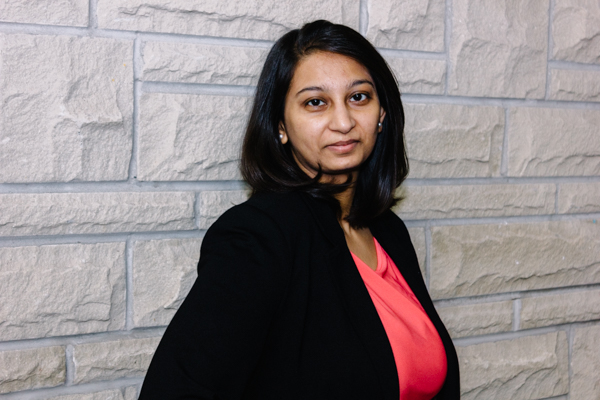Admissions
Equity, Diversity, Inclusion and Decolonization
The School of Graduate and Postdoctoral Studies is committed to equity, diversity, inclusion and decolonization in all aspects of graduate and postdoctoral studies. For more information regarding these commitments please visit grad.uwo.ca/edi-d.
Astronomy
Doctor of Philosophy (PhD)Meet Parshati Patel, PhD candidate in Astronomy

Where is “home” for you?
Ahmedabad, Gujarat, India.
Why did you come to Western for your graduate degree?
When I was applying to graduate schools, I was seeking to work with a supervisor or a group that worked in understanding the physics of circumstellar disks. Western’s Physics & Astronomy department had a large group that worked in this research area and hence Western was my first choice. In addition, Western has the Centre for Planetary Science and Exploration (CPSX), which has allowed me to combine my love of disk physics and planetary science, and I gained a Master’s degree in Astronomy with a collaborative specializaion in Planetary Science and Exploration.
Describe your research in 100 words or less.
I study inner, gaseous disks around young, massive stars. These young stars, which are more massive than our Sun, have a disk of gas and dust surrounding them. It is in this disk that planets form. The inner gaseous region of the disk has hardly been explored. I use observations of these stars and computational circumstellar disk models to constraint the structure of the disk. This not only allows us to understand the disk and its kinematics but also helps understand the effects of the disk on the formation of these stars.
How do you de-stress?
I like to de-stress by watching crime and comedy shows, which revolve around scientific methods and science, such as The Big Bang Theory and Murdoch Mysteries. I also like to cook and catch up on sleep to de-stress.
What is it about your grad program that enables you to thrive and be successful?
Training and opportunities, these two characteristics have shaped me into what I am today. Training under professors, several with very diverse backgrounds, has helped me gained exposure on the variety of hands-on applications involving the work I do. The collaborative program has given me opportunities to gain knowledge and understanding of wider research fields, and enables me to think outside the box when working on my own research. In addition, I have gained a wider variety of skills, whether it be through courses or teaching assistantship, which will allow me to be more employable once I am in the work force.
What are you most passionate about?
Science communication, science literacy and astronomy/planetary science.
What is your “dream” career?
Projector Manager for a Space Mission, or Director of Outreach at a Science Center/Museum.
Program Websites
Program Contact
Brian Davis (bdavis66@uwo.ca)Graduate Affairs Assistant
Department of Physics & Astronomy
Western UniversityPhysics and Astronomy Building Rm 138A
London, Ontario N6A 3K7
t. 519.661.2111 ext. 86639
f. 519-661-2033
Our department offers programs in both physics and astronomy leading to MSc and PhD degrees. We have a vibrant core faculty of 30 researchers covering the areas of astronomy, condensed matter physics, medical physics, atmospheric physics and planetary science.

The Own Your Future doctoral professional development program will help you become a career-ready graduate with the skills necessary to excel in your studies and achieve your future goals. By participating in the program, you will assess your own strengths and opportunities for growth, choose what skills you want to enhance during your time at Western, and learn how to articulate the skills you gained in your degree to optimize your future career opportunities. To learn more, visit www.uwo.ca/ownyourfuture.
Program Length
- 12 Terms
Program Design
- Full-time study
- Thesis-based
Funding Information
Applicants are encouraged to apply for the following scholarships (if eligible):
- Vanier Canada Graduate Scholarships (Vanier CGS)
- Natural Sciences and Engineering Research Council (NSERC)
- Ontario Graduate Scholarship (OGS)
Tuition and Fees
Tuition and fee schedules (per term) are posted on the Office of the Registrar's website at http://www.registrar.uwo.ca/student_finances/fees_refunds/fee_schedules.html
Graduate Student Affordability Calculator
Use this helpful tool to estimate how much money you will need to pay for your tuition, fees, housing, food, and other necessities for a 12-month (three term) academic year.
Admission Requirements
- M.Sc. degree (or equivalent) in either Physics or Astronomy.
- Achieved at least a 70% (B) average taken over all graduate courses.
Additional Requirements
- International students are encouraged to take the GRE-Physics exam to both strengthen their application and to help the Admissions Committee more fairly evaluate it.
English Language Proficiency
Applicants whose first language is not English must furnish evidence of their proficiency in the use of the English language:
Application Deadline
Domestic Applicants:
- January 15 - recommended for Fall term. Later applications may be accommodated on a first-come, first-served basis.
International Applicants:
- March 1 - Fall Term
Students typically begin their studies in September.
Fields of Research
- Astrophysics






